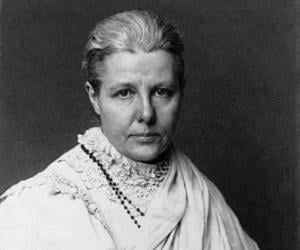By: Albert Serrano | Date Added:

Annie Besant was a political reformer, women’s rights activist, theosophist, and Indian nationalist. She was the leading female figure of the late 19th and early 20th century who actively fought for different causes such as secularism, birth control, Fabian socialism, women's rights, and workers' rights. Besant, early in her life, switched to anti-religious views which led her to work tirelessly as a reformist and secularist. She constantly questioned the status of the Church of England and demanded a secular state through her write-ups, columns, and public speeches. Besant first came to the limelight with her birth-control campaign alongside reformer Charles Bradlaugh. Soon, she became a prominent Fabian socialist but shortly afterwards converted to theosophy. As a member and later President of the Theosophical Society, Besant helped to spread Theosophical beliefs around the world, notably in India. In 1893, she first visited India and soon became involved in the Indian national struggle for freedom. Till the end of her life, she actively campaigned for Indian independence and causes of theosophy. Annie Besant was born as Annie Wood on October 1, 1847, in Clapham, London to a middle-class family of Irish descent. Following the death of her father, young Annie was kept under the care of her mother’s friend Ellen Marryat due to the family’s lack of financial means. Under the guardianship of Marryat, Annie secured a good education. During her early days, she traveled to Europe. These expeditions shaped much of her future thinking and her outlook. It was after her marriage to Anglican clergyman Frank Besant that Annie Besant developed a political bent of mind. Her friendship with English radicals and Manchester Martyrs of the Irish Republican Fenian Brotherhood shaped much of her political thinking. Over the course of her marriage, she became more and more radical in her views. She began to question her faith and stopped attending the Communion as she no longer believed in Christianity. The conflicting opinion between Annie and Frank led the couple to part ways in 1873. Eventually, she left for England with her daughter Mabel. She undertook a part-time study at the Birkbeck Literary and Scientific Institution. Post- marriage, Besant explored her writing skills and started penning short stories, articles and books for children. She became widely recognized for her radical views, as she openly expressed her support for freedom of thought, women’s rights, secularism, birth control, Fabian socialism, and worker’s rights. She became a leading member of the National Secular Society (NSS) and the South Place Ethical Society along with Charles Bradlaugh. Soon enough, she began questioning conventional thinking as a whole. SOURCES - https://www.thefamouspeople.com/profiles/annie-besant-3626.php
Share your thoughts on this story with us. Your comments will not be made public.
Email
Copyright ©2016 - Design By Bureau Blank